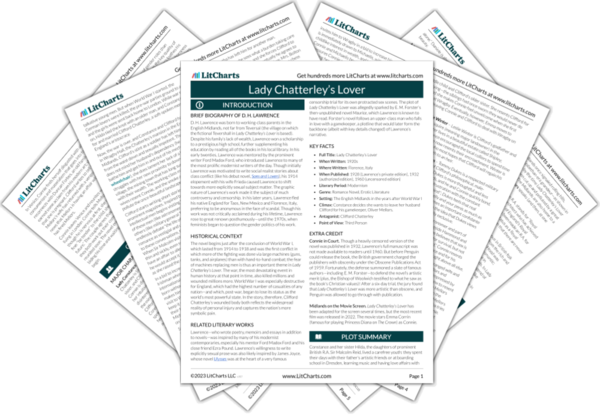Throughout Lady Chatterley’s Lover, flowers symbolize the beauty and strength of nature, even in the face of mechanized threats. Connie’s affair with gamekeeper Oliver Mellors begins in the springtime, as violets and daffodils push their way out of the cold ground. It is only fitting, then, that flowers often stand for the—natural, biological—urges that Connie and Mellors feel for each other. Connie, describing the flowers near Mellors’s hut as “erect” and “alive,” endows them with phallic power and attraction, while Mellors touches Connie during sex as tenderly as “if she were a flower.” Eventually, Mellors and Connie even decorate each other with forget-me-nots and primroses, threading the flowers through each other’s pubic hair as a way of expressing their desire and care.
But just as flowers represent the pure, natural love that Connie and Mellors share, they also hint at the fragility of such love in the face of Clifford’s more mechanical interests. Connie often reflects that the mines, which Clifford fights so valiantly to grow, are “killing the very air” that the flowers need to grow. Moreover, Clifford’s obsession with literature and poetry also does damage to the flowers’ straightforward beauty; instead of appreciating flowers as they are, Connie laments that Clifford uses words to “suck […] all the life-sap out of living things.” In Lady Chatterley’s Lover, then, flowers symbolize not only natural beauty and desire but also the difficulty of preserving these natural pleasures, especially in the face of over-intellectualization and technological destruction.
Flowers Quotes in Lady Chatterley’s Lover
“Thou still unravished bride of quietness,” [Clifford] quoted.—“It seems to fit flower so much better than Greek vases.”
“Ravished is such a horrid word!” [Connie] said. “It’s only people who ravish things.”
“Oh, I don't know…snails and things,” he said.
“Even snails only eat them, and bees don’t ravish.”
She was angry with him, turning everything into words. Violets were Juno’s eyelids, and windflowers were unravished brides. How she hated words, always coming between her and life: they did the ravishing, if anything did: ready-made words and phrases, sucking all the life sap out of living things.
Yet it was spring, and the bluebells were coming in the wood, and the leaf-buds on the hazels were opening like the spatter of green rain. How terrible it was that it should be spring, and everything cold-hearted, cold-hearted. Only the hens, fluffed so wonderfully on the eggs were warm with their hot, brooding female bodies! […]
Life, life! Pure, sparky, fearless new life! New life! So tiny and so utterly without fear! […]
Connie was fascinated. And at the same time, never had she felt so acutely the agony of her own female forlornness. It was becoming unbearable.
The fault lay there, out there, in those evil electric lights and diabolical rattlings of engines. There, in the world of the mechanical greedy, greedy mechanism and mechanized greed, sparkling with lights and gushing hot metal and whirring with traffic, there lay the vast evil thing, ready to destroy whatever did not conform. Soon it would destroy the wood, and the bluebells would spring no more. All vulnerable things must perish under the rolling and running of iron.
He thought with infinite tenderness of the woman. Poor thing, she too had some of the vulnerability of the wild hyacinth, she wasn't all tough rubber goods and platinum, like the modern girl. And they would do her in! As sure as life, they would do her in as they do in all naturally tender life. Tender! Somewhere she was tender.
And the chair began to advance slowly, joltingly down the beautiful broad riding over with blue encroaching hyacinths. Oh last of all ships, through the hyacinths in shallows! Opinions on the last wild waters, sailing in the last voyage of our civilization! Wither, oh weird wheeled ship, your slow course steering. Quiet and complacent, Clifford sat at the wheel of adventure: in his old black hat and tweed jacket, motionless and cautious. Oh captain, my Captain, our splendid trip is done! Not yet though! Downhill in the wake, came Constance in her grey dress, watching the chair jolt downwards.
And he stuck flowers in the hair of his own body, and wound a bit of creeping-jenny round his penis, and stuck a single bell of a hyacinth in his naval. She watched him with amusement, his odd intentness. And she pushed a campion flower in his mustache, where it stuck, dangling under his nose.
“This is John Thomas marryin’ Lady Jane,” he said. “And we mun let Constance an’ Oliver go their separate ways. Maybe—”
[…] “Maybe what? Go on with what you were going to say,” she insisted.
“Ay, what was I going to say?”
He had forgotten. And it was one of the great disappointments of her life, that he never finished.












